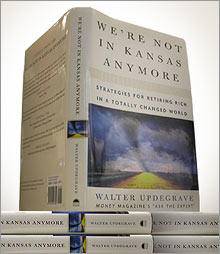|
|

|
|
More information on Updegrave's new book.
|
|
|
|
|
NEW YORK (CNN/Money) -
After reading about the people at United Airlines losing their pensions, I'm beginning to wonder whether my pension is safe. Should people like me who have a corporate pension be concerned about losing our benefits?
-- Anonymous
I agree that the deluge of press accounts in May after United Airlines defaulted on its obligations to more than 120,000 workers and retirees conjured up a pretty bleak picture.
And when you read how the corporate pension system overall is some $450 billion short of the level of assets needed to deliver promised benefits it's easy to make the leap that what happened at United could happen to almost anyone.
In fact, the notion that most Americans' pensions are in jeopardy is overblown.
There's no doubt that for people who lose benefits the experience is devastating -- both financially and emotionally. And I certainly don't want to downplay what those people are going through.
But most corporate pensions aren't in danger of immediate collapse, and most people in those pensions are going to get their full benefit. So we definitely have a situation on our hands that requires reform in the way corporate pensions are funded. But, in my opinion at least, we don't have a crisis where we're going to see huge numbers of companies defaulting on their pensions anytime soon.
Time for a bit of perspective
First, let's be clear that the pension woes that have gotten so much attention lately have nothing to do with the retirement plan you're most likely to have: a 401(k) or similar workplace savings plan.
The versions that are in the news are defined-benefit pensions -- that is, traditional company plans that promise to pay a specific monthly amount in retirement based on your salary and years of service.
The number of these plans has declined by more than 70 percent over the past 20 years, but there are still some 31,000 that cover roughly 44 million workers and retirees.
Even if you're covered by such a plan, however, it doesn't necessarily follow that your benefits are in peril.
For one thing those big underfunded numbers you see can change quite significantly because of the way pension liabilities are calculated.
If interest rates go up, the amount by which a plan is underfunded automatically falls. Similarly, a rising stock market can cut the underfunding gap.
That's not to say that this shortfall isn't serious; it's just that it's huge size today is driven at least in part by the fact that interest rates are so low.
It's also important to keep in mind that the defined-benefit plans that are most at risk of default are the ones concentrated in heavily unionized sectors or industrial firms that are struggling financially.
That would include airlines, auto companies and car-parts manufacturers. If you work for a company that's in decent shape, your chances of losing benefits you've already earned are relatively small even if the plan is currently underfunded.
In fact, even if your company goes bankrupt and defaults on its pension, you may still not see your benefits cut. That's because the federal agency that assumes the liabilities of failed plans -- the Pension Benefit Guaranty Corp. -- typically pays all or nearly all benefits owed to the overwhelming majority of participants.
That said, the PGCG's protection does have limits. And knowing what they are can help can help you gauge your worst-case exposure.
Essentially, PBGC covers benefits up to a maximum guaranteed payment based on your retirement age and a few other factors. The current max for someone whose plan is taken over by the PBGC this year and who retires at 65 is $45,614. (The same limit would apply to someone 65 years old who's already getting payments from a plan that goes broke.)
But that maximum payment drops sharply for younger retirees. The max at age 50, for example, is less than $16,000. (For more on how the PBGC coverage works, click here and here.)
The upshot of these rules: while most retirees tend to come out whole in a pension default, the people most likely to suffer a significant benefit cut are high earners with many years of service and those who retire early with generous early retirement packages.
When Bethlehem Steel's plan was taken over by PBGC in 2003, for example, some workers who'd retired at 50 saw their monthly pension benefit cut by two-thirds from $3,600 to $1,200 a month.
Unfortunately, if you're unlucky enough to work for a company that appears likely to default on its pension obligations, there's virtually nothing you can do to stop it.
So your best protection against your retirement plans being derailed by an unexpected cut in your company's pension payments your best bet is to save as much as possible in a 401(k) or other retirement account, which will give you a separate retirement stash to fall back on.
If your employer doesn't offer that option, there are always IRAs and regular mutual fund or brokerage accounts.
If there's one hopeful sign that's come out of the United default, it's that this fiasco may actually spur Congress to enact much-needed reforms in the rules that govern how much companies must contribute to keep their pensions healthy and to the PBGC to assure the agency has sufficient assets to pay participants in failed plans.
The Bush administration has already released a set of proposals for pension reform and lawmakers in both the House and Senate are working on legislation to address this issue. Let's hope they actually move on this issue and come up with some reforms that improve the situation.
Walter Updegrave is a senior editor at MONEY Magazine and is the author of "We're Not in Kansas Anymore: Strategies for Retiring Rich in a Totally Changed World."

|